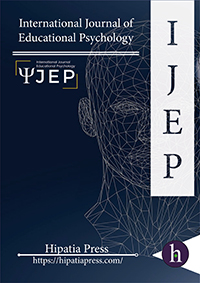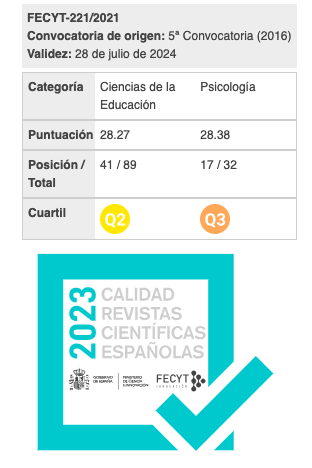English teachers' self-efficacy beliefs and students learning approaches
Keywords:
Downloads
Abstract
This study aimed at investigating the direct and indirect effects that teachers' self-efficacy beliefs exert on students' learning approaches via affecting their perceptions of classroom structure. The sample included 40 English teachers and 240 first-grade female students from high schools in Iran. To collect data, three questionnaires were applied: (a) Self-Efficacy Beliefs Questionnaire was answered by the teachers, and (b) Study Process Questionnaire and Survey of Classroom Structure Goals were given to the students. Path analysis revealed that, via Motivating Tasks, Mastery Evaluation, and Autonomy Support, teachers' self-efficacy beliefs had an indirect and positive effect on students' deep learning approaches but an indirect and negative effect on their surface learning approaches. Also, teachers' self-efficacy beliefs affected students' deep learning approaches directly and positively but their surface learning approaches directly and negatively. Moreover, it was found that Motivating Tasks, Mastery Evaluation, and Autonomy Support had direct and positive effects on students' deep learning approaches but direct and negative effects on their surface learning approaches. All the relationships between model variables were statistically significant. The results tend to verify that students' perception of classroom structure plays a mediating role between teachers' self-efficacy beliefs and students' learning approaches.
Downloads
References
Alderman, M.Kay.(1999). Motivation For Achievement. New Jersey: Lawrence Erlbaum Associates, Publishers.
Google Scholar CrossrefAllinder, R. M. (1994). The relationship between efficacy and the instructional practices of special education teachers and consultants. Teacher Education and Special Education, 17,86e95.
Google Scholar CrossrefAmes, C. (1992b). Achievement goals and the classroom motivational climate. In D. H. Schunk & J. Meece (Eds.), Student perceptions in the classroom (pp. 327–348). Hillsdale, NJ: Erlbaum
Google Scholar CrossrefAnderson, L., 2004. Increasing Teacher Effectiveness, second ed. UNESCO International Institute for Educational Planning. (retrieved July 2007).
Google Scholar CrossrefAnderson, R., Greene, M., & Loewen, P. (1988). Relationships among teachers’ and students’ thinking skills, sense of efficacy, and student achievement. Alberta Journal of Educational Research, 34(2), 148–165.
Google Scholar CrossrefBandura, A. (1977). Self-efficacy: toward a unifying theory of behavioral change.
Google Scholar Crossrefbased reform and the poverty gap: Lessons for ‘ no child left behind’. Washington,
Google Scholar CrossrefBiggs, J.B. & Rihn, B.A. (1984). The effects of intervention on deep and surface approaches to learning. In J.R. Kirby (Ed.), Cognitive strategies and educational performance. Florida: Academic Press.
Google Scholar CrossrefBiggs, J.B. (1976). Dimension of study behaviour: another look at ATI. British Journal of Educational Psychology, 46, 68-80.
Google Scholar CrossrefBiggs, J.B. (1993a). From theory to practice: a cognitive systems approach. Higher Education Research and Development, 12, 73-85.
Google Scholar CrossrefBiggs,J (1999): Teaching for Quality Learning at University: what the student does, (SRHE and Open University Press, Buckingham).
Google Scholar CrossrefBiggs,J ., Kember, D., Leung, Y.P (2001). The revised two-factor study process Questionnaire: R-SPO-2F. British Journal of Educational Psychology, 71, 133-149.
Google Scholar CrossrefBlackburn, M, (1998). Academic cheating, Unpublished doctor dissertation,
Google Scholar CrossrefUniversity of Oklahoma.
Google Scholar CrossrefBoekaerts, M. E. (1999). Self-regulated learning: Where we are today. International Journal of Educational Research, 31(6), 445-551.
Google Scholar CrossrefCase, J.M., & Gunstone, R. (2003). Going deeper than deep and surface approaches: a study of students’ perceptions of time. Teaching in Higher Education, 8, 55-69.
Google Scholar CrossrefChacon, C. T. (2005). Teachers' perceived efficacy among English as a foreign language teachers in middle schools in Venezuela. Teaching and Teacher Education, 21, 257−272.
Google Scholar CrossrefCurry, L. (2002). Individual differences in cognitive style, learning style and instructional preferences in medical education. In G. Norman, C. van der Vleuten, & D. Newble (Eds.), International handbook of research in medical education (pp. 357e378). Dordrecht, The Netherlands: Kluwer.
Google Scholar CrossrefCzerniak, C. M., & Schriver, M. L. (1994). An examination of preservice science
Google Scholar Crossrefteachers' beliefs and behaviors as related to self-efficacy. Journal of Science
Google Scholar CrossrefTeacher Education, 5,77e86.
Google Scholar CrossrefCzerniak, C., & Chiarelott, L. (1990). Teacher education for effective science instruction a social cognitive perspective. Journal of Teacher Education, 41,49-58.
Google Scholar CrossrefCzerniak, C., & Chiarelott, L. (1990). Teacher education for effective science instruction e a social cognitive perspective. Journal of Teacher Education, 41,49e58.
Google Scholar CrossrefDC: Brookings Institute.
Google Scholar CrossrefDeci, E. L., Vallerand, R. J., Pelletier, L. G. & Ryan, R. M. (1991). Motivation and Education: The self-determination perspective. Educational Psychologist, 26, 325-346.
Google Scholar CrossrefDesimone, L., Smith, T., & Frisvold, D. (2007). Has NCLB improved teacher and
Google Scholar CrossrefEducational Psychology, 76, 569e582.
Google Scholar CrossrefEley, M.G. (1992). Differential adoption of study approaches within individual students. Higher Education, 23, 231-254.
Google Scholar CrossrefElliot, A. J., & Thrash, T. M. (2001). Achievement goals and the hierarchical model of achievement motivation. Educational Psychology Review, 13, 139–156.
Google Scholar CrossrefElliot, A. J., McGregor, H. A., & Cable, S. (1999). Achievement goals, study strategies, and exam performance: A mediational analysis. Journal of Educational Psychology, 91, 549–563.
Google Scholar CrossrefEnochs, L. G., Scharmann, L. C., & Riggs, I.M. (1995). The relationship of pupil control to preservice elementary science teaching self-efficacy and outcome expec-
Google Scholar Crossreftancy. Science Teacher Education, 79,3e75.
Google Scholar CrossrefEntwistle, N., & Ramsden, P. (1983). Understanding Student Learning. London: Croom Helm.
Google Scholar CrossrefEntwistle, N., Kozeki, B. & Tait, H. (1989b). Pupils’ perceptions of school and teachers. II – Relationships with motivation and approaches to learning. British Journal of Educational Psychology, 59(3), 340-350
Google Scholar CrossrefGibson, S., & Dembo, M. (1984). Teacher efficacy: a construct validation. Journal of
Google Scholar CrossrefEducational Psychology, 76, 569e582.
Google Scholar CrossrefGreene, B. A., & Miller, R. B. (1996). Influences on course performance: Goals, perceived ability, and self-regulation. Contemporary Educational Psychology, 21, 181–192.
Google Scholar CrossrefGreene, B.A., Miller.R.B., Crowson,M., Duke, B.L & Akey. K.L(2004). Predicting high school students cognitive engagement and achievement: Contributions of classroom perceptions and motivation. Contemporary Educational Psychology 29 (2004) 462–482.
Google Scholar CrossrefGuskey, T. R. (1988). Teacher efficacy, self-concept, and attitudes toward the implementation of instructional innovation. Teaching and Teacher Education, 4, 63-69.
Google Scholar CrossrefJordan,A.,Kircaali-Iftar,G.,&Diamond, C.T.P. (1993).Who has a problem, the student or the teacher? Differences in teachers’ beliefs about their work with at-risk and integrated exceptional students. International Journal of Disability ,Development and Education, 43, 45-62.
Google Scholar CrossrefKember, D., & Gow, L. (1990). Cultural specificity of approaches to study. British Journal of Educational Psychology, 60, 356-363
Google Scholar CrossrefKember, D., & Wong A. (2000). Implications for evaluation from a study of students’ perceptions of good and poor teaching. Higher Education, 40, 69-97.
Google Scholar CrossrefKurbanoglu, S.(2004). "Oz yeterlilik Inanci ve Bilgi Profesyonelleri Icin Onemi" (Self-Efficacy Belief and its Importance for Information Professionals). Bilgi Dunyasi, 5(2): 137-152.
Google Scholar CrossrefMarton, F. & Saljo, R. (1976a). On qualitative differences in learning: I - Outcomes & process. British Journal of Educational Psychology, 46, 4-11.
Google Scholar CrossrefGoogle Scholar Crossref
Mashburn, A. J., Pianta, R. C., Barbarin, O. A., Bryant, D., Hamre, B. K., Downer, J. T., et al. (2008). Measures of classroom quality in prekindergarten and children's development of academic, language, and social skills. Child Development, 79,732e749.
Google Scholar CrossrefMergendoller, J. R.Maxwell, N. L. & Bellisimo, Y. (2000). Comparing problem-based learning and traditional instruction in high school economics. Journal of Educational Research, 93, 374-382.
Google Scholar CrossrefGoogle Scholar Crossref
Miller, R. B., Behrens, J. T., Greene, B. A., & Newman, D. (1993). Goals and perceived ability: Impact on student valuing, self-regulation and persistence. Contemporary Educational Psychology,18, 2–14.
Google Scholar CrossrefNewble, D.I., & Clark, R. (1986). The approaches to learning of students in a traditional and an innovative problem-based medical school. Medical Education, 20, 267-273
Google Scholar CrossrefPajares, M.F., 1992. Teachers’ beliefs and educational research: clearing up a messy construct. Review of Educational Research 62 (3), 307–332.
Google Scholar CrossrefPintrich, P. R., & Garcia, T. (1991). Student goal orientation and self-regulation in the college. In M. Maehr & P. R. Pintrich (Eds.), Advances in motivation and achievement: Goals and self-regulatory processes (Vol. 7, pp. 271–402). Greenwich, CT: JAI Press.
Google Scholar CrossrefPodell, D.M.,&Soodak, L. C. (1993). Teacher efficacy and bias in special education referrals. Journal of Educational Research, 86, 247-253.
Google Scholar CrossrefProsser, M. & Trigwell, K. (1999). Understanding learning and teaching: The experience in higher education. Buckingham: Society for Research into Higher Education.
Google Scholar CrossrefRamsden, P. (1992). Learning to teach in higher education. London: Routledge.
Google Scholar CrossrefRoss, J. A., Hogaboam-Gray, A., & Hannay, L. (2001). Collateral benefits of an
Google Scholar Crossrefinteractive literacy programfor grade one and two students. Journal of Research
Google Scholar Crossrefon Computing in Education, 33, 219–234.
Google Scholar CrossrefRoss, J.A., 1994. Beliefs that make a difference: the origins and impacts of teacher efficacy. In: Paper Presented at the Annual Meeting of the Canadian Association for Curriculum Studies.
Google Scholar CrossrefRyan, A. M., Gheen, M. H., & Midgley, C. (1998). Why do some students avoid asking for help? An examination of the interplay among students’ academic efficacy, teachers’ social-emotional role, and the classroom goal structure. Journal of Educational Psychology, 90(3), 528-535.
Google Scholar CrossrefSkaalvik, E. M., & Skaalvik, S. (2007). Dimensions of teacher self-efficacy and rela-
Google Scholar Crossreftions with strain factors, perceived collective teacher efficacy, and teacher burnout. Journal of Educational Psychology, 99,611e625.
Google Scholar CrossrefSnow, R. E., & Jackson, D. N. (1994). Individual differences in conation: Selected constructs and measures. In H. F. C. Neil & M. Drillings (Motivation: Theory and Research (pp. 71-100). Hillsdale, New Jersey: Lawrence Erlbaum.
Google Scholar CrossrefSvensson, L. (1977). Symposium: Learning processes and strategies – III On qualitative differences in learnig: III – Study skill learning. British Journal of Educational Psychology, 47, 233-243
Google Scholar CrossrefWatkins, D. & Akande, A. (1994). Approaches to learning of Nigerian secondary school children: Emic and ethic perspectives. International Journal of Psychology, 29(2), 165182.
Google Scholar CrossrefWilliams, M., Burden, R., 2000. Psychology for language teachers: a social constructivist approach. Cambridge University Press, Cambridge.
Google Scholar CrossrefWolters, C. A., & Daugherty, S. G. (2007). Goals structures and teachers’ sense of
Google Scholar Crossrefefficacy: their relation and association to teaching experience and academic
Google Scholar Crossreflevel. Journal of Educational Psychology, 99 (1), 181-193.
Google Scholar CrossrefWoolfolk Hoy, A. (1998). Complexity and coherence: An essay review of the Handbook of educational psychology. Teachers College Record, 100, 437-452
Google Scholar CrossrefWoolfolk Hoy, A.W., Spero, R.B., 2000. Changes in Teacher Efficacy during the Early Years of Teaching: An Exploratory Study. (retrieved July 2007).
Google Scholar CrossrefWoolfolk, A., & Hoy, W. K. (1990). Prospective teachers' sense of efficacy and beliefs about control. Journal of Educational Psychology, 82,81e91.
Google Scholar CrossrefWoolfolk, A., & Hoy, W. K. (1990). Prospective teachers' sense of efficacy and beliefs about control. Journal of Educational Psychology, 82,81e91.
Google Scholar CrossrefDownloads
Published
Almetric
Dimensions
How to Cite
Issue
Section
License
All articles are published under Creative Commons copyright (CC BY). Authors hold the copyright and retain publishing rights without restrictions, but authors allow anyone to download, reuse, reprint, modify, distribute, and/or copy articles as the original source is cited.
















